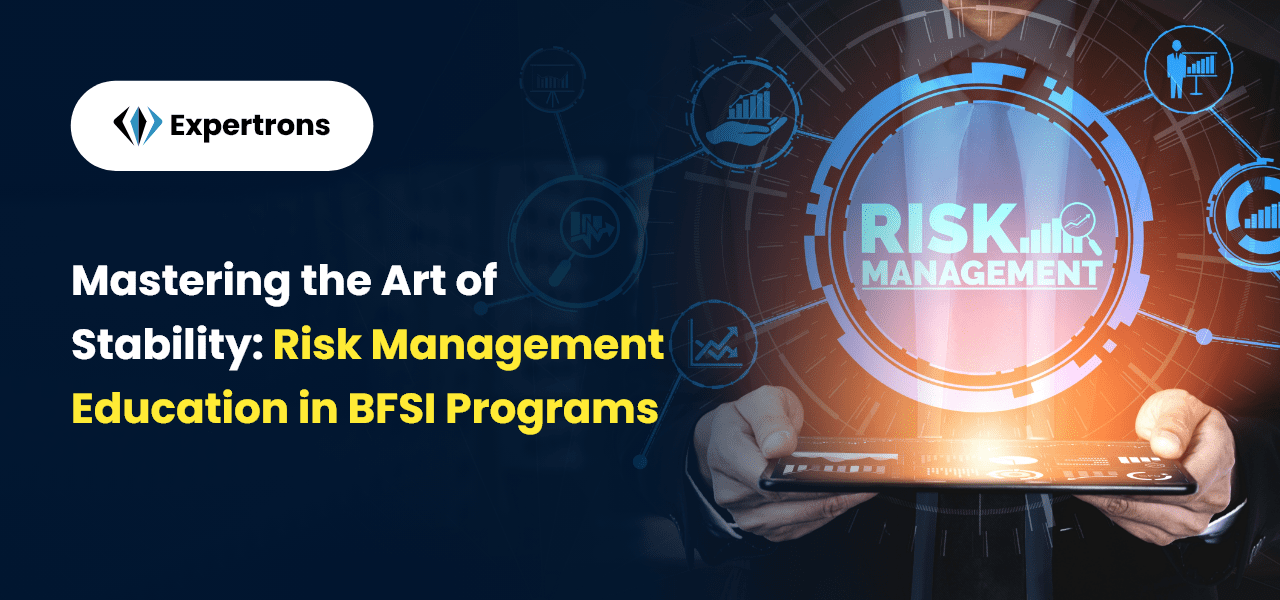Introduction
In the dynamic realm of Banking, Financial Services, and Insurance (BFSI), the ability to navigate uncertainties is a crucial skill. Risk management education emerges as a beacon, equipping professionals with the knowledge and strategies to steer through financial complexities. Join us as we delve into the importance of risk management education in BFSI programs and how it empowers professionals to effectively mitigate uncertainties.
Understanding the Landscape: The Need for Risk Management Education
In a world where financial landscapes are shaped by unpredictability, BFSI professionals face a myriad of challenges. The importance of risk management education becomes evident as it serves as the compass guiding individuals through the intricacies of financial uncertainties.
Key Components of Risk Management Education
Comprehensive Risk Assessment
In-depth exploration of risk assessment methodologies, enabling professionals to identify and evaluate potential risks across diverse financial scenarios.
Strategic Risk Mitigation
Equipping individuals with effective strategies to mitigate identified risks, emphasizing proactive measures and a forward-thinking approach.
Regulatory Compliance
Understanding and navigating the complex web of regulatory requirements, ensuring that professionals are well-versed in compliance standards within the BFSI sector.
Real-world Application: Navigating Financial Uncertainties
The true test of risk management education lies in its application to real-world scenarios. BFSI programs integrate practical case studies, simulations, and industry-relevant projects to provide hands-on experience. This prepares professionals to navigate financial uncertainties with a blend of theoretical knowledge and practical insights.
Also read, Navigating BFSI’s Digital Frontier: Cybersecurity Insights
Impact on Career Advancement
Professionals equipped with robust risk management education often find themselves on an accelerated trajectory in their careers. Employers recognize the value of individuals who can navigate uncertainties, make informed decisions, and contribute to the stability of financial institutions.
The Role of Technology
With the rapid evolution of technology, BFSI programs integrate the latest tools and platforms into risk management education. Professionals learn to leverage data analytics, artificial intelligence, and other technological advancements to enhance risk assessment and decision-making processes.
Also read, Unveiling the Power of Data Science: A Beginner’s Guide
Conclusion
In conclusion, risk management education in BFSI programs serves as a compass, guiding professionals through the turbulent waters of financial uncertainties. As the industry continues to evolve, individuals equipped with these skills become the architects of stability, steering institutions towards sustainable growth.
Frequently Asked Questions
Risk management education is crucial as it equips professionals to identify, assess, and mitigate financial uncertainties, ensuring the stability of institutions in the volatile BFSI sector.
Technology is integrated into risk management education to leverage tools like data analytics and AI, enhancing professionals’ abilities to assess and mitigate risks in real-time.
Professionals with risk management education experience accelerated career advancement, as their skills are highly valued by employers seeking stability in BFSI careers.
The BFSI sector is exposed to various risks, including market volatility, credit risks, operational challenges, and regulatory changes. These risks, if not managed effectively, can lead to financial instability and erode stakeholder trust. Risk management education is essential as it equips professionals with the skills to identify, assess, and mitigate these risks, fostering stability and ensuring institutions can navigate challenges successfully.
Risk management education enables professionals to adopt a proactive approach by identifying potential risks before they materialize. Through comprehensive training in risk assessment and scenario analysis, individuals can anticipate challenges and implement timely mitigation strategies. This proactive stance is crucial for maintaining financial health, safeguarding stakeholder interests, and ensuring the long-term sustainability of BFSI institutions.











